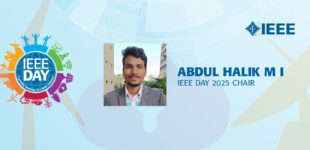July 8, 2025
Every technologist has a unique career journey with a multitude of opportunities to grow and make an impact in their field. Hear from IEEE members on their involvement with the IEEE community.
Subodha Charles, IEEE Member
Video transcript:
When I move forward in my career at different stages, there are different requirements. What you had when you were a student is not the same as when you are ten years into a career. IEEE has had resources to support me in each one of these steps. So I believe throughout my professional career, I can get something from IEEE. And of course, I can give something back to IEEE as well.
How are you currently using AI in your field?
My research area, the one that I followed for my post-grad, is on computer architecture, that is commonly known as CHIPS. And to be a bit more specific, I worked on hardware security, so that’s on how do you secure your devices at the hardware level. When you look at the recent advancements of AI, many people are looking at application-specific hardware to accelerate things like machine learning in that space. People will start developing more and more application-specific hardware to make those things work. So you will see, rather than having one thing do many things, you will have like so many different things for specific applications. So in that space, you will definitely have challenges in terms of how do you secure everything. Because with IoT, you know everything is getting connected. Things will start getting smaller and smaller in that space. How do you secure the whole thing?
As an entrepreneur, we develop infrastructure for the power grid. So in that sense, we are modernizing something that’s been there for a long time. It’s legacy infrastructure. So with that connectivity, of course, comes the threats of cybersecurity. So that’s one of the main focus areas because when you have like the entire power grid, the distribution network all connected, maybe with one single attack, you can have lights off. So, how do you prevent that from happening when you’re designing things from the ground up? So that will definitely be a concern in the, in the, it’s a concern right now. And it will only exacerbate in the future.
What cybersecurity challenges exist in the modern energy grid?
So compared to what happened in the past, right now, we are having distributed energy sources. It can be solar, can be wind, can be many other sources that provide energy from different locations to the power grid. So in that setup, having a modernized power grid will definitely help, because I wouldn’t be surprised that in the near future—in fact, it’s a conversation right now—having a modular nuclear reactor, it can be in your backyard, so it will be small enough, and safe, to enable that from happening.
What are your tech predictions for the future?
My predictions for the future, and I believe it’s true, we had a huge boom of generative AI in the last two years or so, and I believe that will continue with the introduction of agents, which, you not only have a typing kind of a conversation, you have a conversation verbally, with something maybe on your phone or in your PC, and then you get things done. So rather than maybe booking a hotel or a flight through an interface, you talk, you have a conversation, you get back and forth questions and answers, and then you settle on what you need to do. And then it happens. That will definitely be something that we interact with in the near future.
How has IEEE impacted your career?
So the way it has helped me in my career in many ways, and I would rank networking at the very top there, of course, tangible benefits that you can get out of IEEE. You get to travel to conferences, you present your research, and you get professional development material. But beyond all that, I found networking to be the most beneficial thing. I’m sure that’s the case for many other people as well, the people that I met. So in different stages in my career, networking, networking has helped in different ways. When I first graduated with my bachelor’s, I was looking for, post-grad master’s PhD. The network really helped because then I could tap into opportunities and get recommendations from people, so that was really valuable. And later on during the career, when we were collaborating on research applications or developing a product, one, the knowledge comes in handy and then you can find complementary skills in other people from your network. So there are many things we can go on and on, but networking sits at the top of the benefits that I got from IEEE.
Chad Kidder, IEEE Senior Member
Video transcript:
I joined IEEE in 1999 as an undergraduate at Texas A&M University. I wanted to get involved in my field and see what else is out there and participate in the community.
How has networking with IEEE members in your field assisted your career?
It’s been a great experience to get to know people in my area and worldwide in my field. Having that reach has really helped me in my career, especially when I’m the technical expert and I need answers that I don’t necessarily have.
What is your favorite IEEE conference?
My favorite IEEE conference is the International Microwave Symposium. It was just mind-expanding, getting there, getting to see everything that was going on. Because as a young engineer, you learn stuff in school, you learn what your company was doing. Just to see everything else out there, it was, it was just, mind expanding. It, it gave me new ideas, new, new thoughts to have new ways to do my craft, new connections that I could ask.
What are your tech predictions for the future?
I think one of the big things we’re going to see in the next couple of years is the importance of software quality, especially in embedded devices and on smaller teams, because you have a lot of engineers that can write code, but they don’t necessarily have the robustness of, you know, getting good code that works all the time, that goes out the door.
Aishwarya Bandla, IEEE Senior Member
Video transcript:
When we think of IEEE, the immediate aspect that comes to mind is the advancements in technology and being connected to the latest, cutting-edge trends in technology.
When did you join IEEE?
I started as an IEEE member during my research days in biomedical engineering. And then I went on to engage as a volunteer, beginning with IEEE Women in Engineering and then, moving on to IEEE Young Professionals and the people I connect with, these initiatives and this community is what really keeps me going, engaging with IEEE. I had the opportunity to lead an enthusiastic group of volunteers in Region 10, which is Asia Pacific. And, this team of young professionals have come together in the past two years to really drive a lot of wonderful initiatives in the region, and the impact of which is now going global.
What’s an unexpected benefit of being an IEEE Member?
An unexpected benefit of working with IEEE as a volunteering member has been being connected to purpose-driven individuals and coming together as a community to drive meaningful impact.
What are you currently working on?
I work in health technology innovation, and specifically I’m working on a medical device to improve the quality of life of cancer patients undergoing chemotherapy. As technology professionals and innovators, we really have the power of innovating and influencing change in the community.
What message do you have for young professionals?
As a young professional, my message to the world would be for everyone to think about how you can use this power to create meaningful impact in and around your community.
What are your tech predictions for the future?
Digital health is revolutionizing several aspects of healthcare. But for me, the biggest impact is where technology is bridging the gap between the provider and the patient. And, the whole aspect of making technology more user centric and user driven is what’s probably going to drive more impact in innovation in this space.





 Meaningful Momentum or Running in Place?
Meaningful Momentum or Running in Place? AI Through Our Ages
AI Through Our Ages Liquid Infrastructure: Our Planet's Most Precious Resource
Liquid Infrastructure: Our Planet's Most Precious Resource The Impact of Technology in 2025
The Impact of Technology in 2025 Quantum and AI: Safeguards or Threats to Cybersecurity?
Quantum and AI: Safeguards or Threats to Cybersecurity? Why AI Can't Live Without Us
Why AI Can't Live Without Us Bits, Bytes, Buildings and Bridges: Digital-Driven Infrastructure
Bits, Bytes, Buildings and Bridges: Digital-Driven Infrastructure Impact of Technology in 2024
Impact of Technology in 2024 Emerging AI Cybersecurity Challenges and Solutions
Emerging AI Cybersecurity Challenges and Solutions The Skies are Unlimited
The Skies are Unlimited Smart Cities 2030: How Tech is Reshaping Urbanscapes
Smart Cities 2030: How Tech is Reshaping Urbanscapes Impact of Technology 2023
Impact of Technology 2023 Cybersecurity for Life-Changing Innovations
Cybersecurity for Life-Changing Innovations Smarter Wearables Healthier Life
Smarter Wearables Healthier Life Infrastructure In Motion
Infrastructure In Motion The Impact of Tech in 2022 and Beyond
The Impact of Tech in 2022 and Beyond Cybersecurity, Technology and Protecting Our World
Cybersecurity, Technology and Protecting Our World How Technology Helps us Understand Our Health and Wellness
How Technology Helps us Understand Our Health and Wellness The Resilience of Humanity
The Resilience of Humanity Harnessing and Sustaining our Natural Resources
Harnessing and Sustaining our Natural Resources Creating Healthy Spaces Through Technology
Creating Healthy Spaces Through Technology Exceptional Infrastructure Challenges, Technology and Humanity
Exceptional Infrastructure Challenges, Technology and Humanity The Global Impact of IEEE's 802 Standards
The Global Impact of IEEE's 802 Standards Scenes of our Cyber Lives: The Security Threats and Technology Solutions Protecting Us
Scenes of our Cyber Lives: The Security Threats and Technology Solutions Protecting Us How Millennial Parents are Embracing Health and Wellness Technologies for Their Generation Alpha Kids
How Millennial Parents are Embracing Health and Wellness Technologies for Their Generation Alpha Kids Space Exploration, Technology and Our Lives
Space Exploration, Technology and Our Lives Global Innovation and the Environment
Global Innovation and the Environment How Technology, Privacy and Security are Changing Each Other (And Us)
How Technology, Privacy and Security are Changing Each Other (And Us) Find us in booth 31506, LVCC South Hall 3 and experience the Technology Moon Walk
Find us in booth 31506, LVCC South Hall 3 and experience the Technology Moon Walk Virtual and Mixed Reality
Virtual and Mixed Reality How Robots are Improving our Health
How Robots are Improving our Health IEEE Experts and the Robots They are Teaching
IEEE Experts and the Robots They are Teaching See how millennial parents around the world see AI impacting the lives of their tech-infused offspring
See how millennial parents around the world see AI impacting the lives of their tech-infused offspring Take the journey from farm to table and learn how IoT will help us reach the rising demand for food production
Take the journey from farm to table and learn how IoT will help us reach the rising demand for food production Watch technical experts discuss the latest cyber threats
Watch technical experts discuss the latest cyber threats Explore how researchers, teachers, explorers, healthcare and medical professionals use immersive technologies
Explore how researchers, teachers, explorers, healthcare and medical professionals use immersive technologies Follow the timeline to see how Generation AI will be impacted by technology
Follow the timeline to see how Generation AI will be impacted by technology Learn how your IoT data can be used by experiencing a day in a connected life
Learn how your IoT data can be used by experiencing a day in a connected life Listen to technical experts discuss the biggest security threats today
Listen to technical experts discuss the biggest security threats today See how tech has influenced and evolved with the Games
See how tech has influenced and evolved with the Games Enter our virtual home to explore the IoT (Internet of Things) technologies
Enter our virtual home to explore the IoT (Internet of Things) technologies Explore an interactive map showcasing exciting innovations in robotics
Explore an interactive map showcasing exciting innovations in robotics Interactively explore A.I. in recent Hollywood movies
Interactively explore A.I. in recent Hollywood movies Get immersed in technologies that will improve patients' lives
Get immersed in technologies that will improve patients' lives